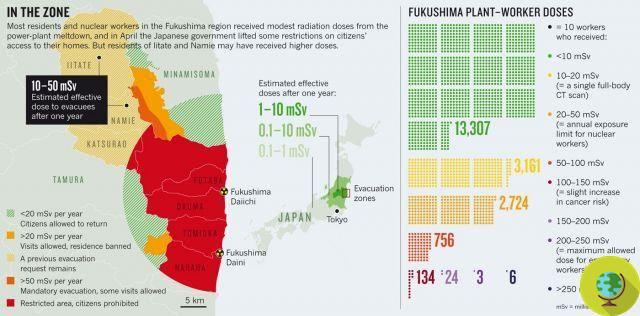
Fukushima, cancer. The risk of cancer has been decreed as increased for the populations living in the vicinity of the Fukushima plant, according to a statement from the World Health Organization (WHO). This risk would be limited to local communities and some workers engaged in emergency work and would not affect the rest of the Japanese population.
Don't store avocado like this: it's dangerous
Tumors increase in Fukushisma, finally notices even theOMS.He cancer risk was decreed as increased for populations living in the vicinity of central of Fukushima, In accordance to communique by the World Health Organization (WHO). This risk would be limited to local communities and some workers engaged in emergency work and would not affect the rest of the Japanese population sfold the WHO.
The current report is part of an ongoing assessment by international experts on the consequences of the serious damage suffered by the Japanese power plant following the tsunami caused by the 9.0 magnitude earthquake two years ago, in March 2011. What happened caused theradiation emission which led to the creation of an evacuation zone extending for 20 kilometers.
I higher health risks have been identified for i infants exposed to radiation, compared with children and adults. The girls exposed to radiation after the accident, when they were still newborns, have a 4% increase in the risk of solid tumors and a 6% increase in breast cancer.
For the male births exposed to radiation a 7% increase in the risk of suffering has been calculated leukemia than would be indicated for the normal population. However, the greatest increase in cancer risk concerns female baby girls, which could face a risk increased by 70% to contract a thyroid cancer, due to radiation exposure, unlike their peers who lived far from Fukushima.
However, the WHO is keen to emphasize that it is a matter of relative risks and that in general they were rather low. However, it will be necessary in the opinion of expert WHO members, such as the doctor Maria Neira, intervene with operations of health monitoring and with medical support interventions aimed at those who have been exposed to the greatest risks due to radiation. Overall, in his opinion, the impact on the health of the Japanese population of the radiation would be considered rather limited, especially outside the high-risk areas in the vicinity of Fukushima.
To criticize the report released by WHO Greenpeace accusing the world health organization of minimizing the impact of the first radioactive emissions of the Fukushima disaster on people inside the evacuation zone: "WHO should have estimated the radiation exposure of these people to give a more accurate picture of the potential long-term impacts of Fukushima "- firmed up Rianne Teule, Greenpeace International's nuclear radiation expert - “The report is scandalously trying to minimize the likelihood that thousands of people are at risk of cancer after the Fukushima disaster. It hides the health impact by presenting it as "small percentage increases in the onset of cancer": those small percentages translate into thousands of people who are at risk ".
The association accuses the WHO of do not offer a scientific analysis of people's health and to have political purposes to protect the nuclear industry given that the release of the report on the impact of radioactivity on the population is subject to the approval of the IAEA (International Atomic Energy Agency). For this he would have ignored the various alarms issued by Greenpeace in the wake of the disaster and the measurements in the contaminated areas carried out by the environmental association.
Marta Albè


























